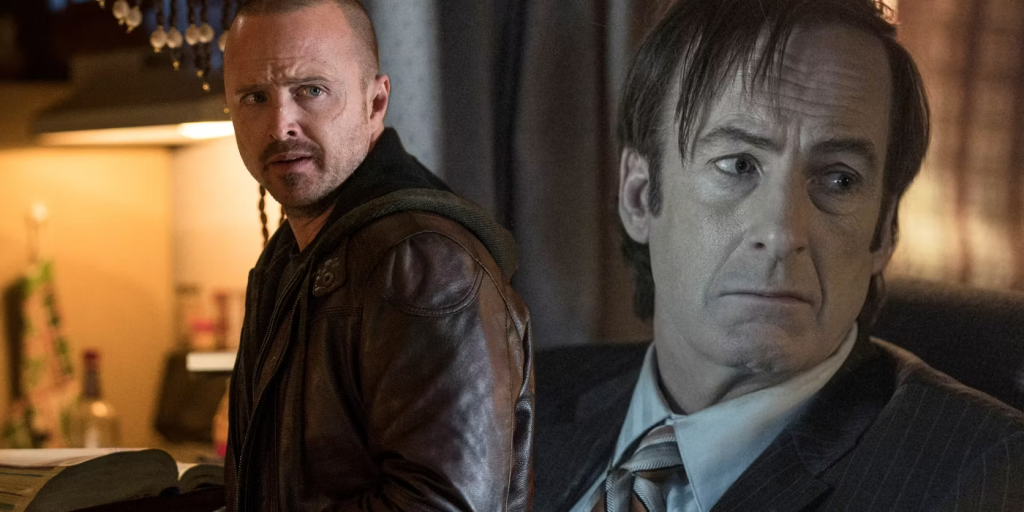
Aaron Paul, best known for his iconic role as Jesse Pinkman in the hit series “Breaking Bad,” recently made a startling revelation regarding the streaming of the show on Netflix. Despite the immense popularity and enduring appeal of “Breaking Bad,” Paul disclosed that he does not receive any payment from Netflix for the show’s availability on their platform. This revelation came during a pivotal moment in the entertainment industry when discussions about fair compensation for actors and creators in the streaming era are gaining prominence.
Paul’s candid statement about not receiving compensation for “Breaking Bad” on Netflix was made during a visit to the picket lines organized by SAG-AFTRA (Screen Actors Guild‐American Federation of Television and Radio Artists) and WGA (Writers Guild of America) on August 29. Joined by fellow “Breaking Bad” cast members Bryan Cranston and Jesse Plemons, Paul participated in the picketing action in front of Sony Pictures Studios, the studio responsible for producing the acclaimed series.
The connection between “Breaking Bad” and Netflix dates back to 2013 when streaming platforms were just beginning to gain traction. The show’s availability on Netflix not only contributed to its wider recognition but also played a crucial role in fueling its continued production. This mutually beneficial relationship helped cement Netflix’s position in the entertainment industry.

Recent developments, such as show creator Vince Gilligan’s five-year deal with Netflix, have further expanded the “Breaking Bad” universe, ensuring its relevance for newer generations of viewers. However, despite the show’s enduring popularity, Paul’s revelation highlights a significant issue within the industry: the fair compensation of actors and creators when their work continues to generate revenue on streaming platforms.
Paul’s comments reflect a broader industry concern, where actors and creators feel they deserve a fair share of the revenue generated by their work on streaming platforms, especially when shows like “Breaking Bad” continue to attract large audiences long after their initial release.
While Paul’s statement sheds light on this critical issue, the compensation structure for on-screen talent in the context of streaming deals remains complex and opaque. The interaction between studios, streaming platforms, and talent compensation is a multifaceted matter with no easy solutions.
In the case of “Breaking Bad,” Sony Pictures Television, one of the few major studios without its own streaming platform, has relied on licensing agreements to maintain profitability in the streaming era. These agreements involve licensing the show to various streaming platforms, including Netflix, which allows them to stream the series for a specific period.

However, how on-screen talent is compensated in these arrangements remains less transparent. The issue of fair compensation, especially in cases of increased viewership on streaming platforms, has become a central point of contention during the ongoing strikes by industry guilds like SAG-AFTRA and WGA.
For example, members of the Writers Guild of America have pointed to the phenomenon known as the “Suits” case. This scenario involves writers receiving residuals when a show is licensed to a streaming service like Netflix. Still, when a surge in viewership occurs, the writers do not see an immediate increase in compensation. Instead, the increased viewership potentially influences future licensing negotiations.
While Aaron Paul’s revelation highlights the need for fair compensation in the streaming era, the intricacies of these compensation models are far from straightforward. Negotiations between studios, streaming giants, and industry unions will likely continue to shape the future of compensation for actors and creators in the evolving landscape of digital entertainment.
Netflix declined to comment on the matter, directing inquiries to Sony Pictures, which, as of the time of the report, had not provided a response. Despite the complexities surrounding this issue, Aaron Paul and other industry figures remain hopeful and committed to achieving a fair and equitable compensation system for all stakeholders in the ever-evolving world of streaming entertainment.
We bring out some of the most well-known Disney collection, all of which are available at reasonable costs. Visit our link now if you are interested in the Disney collection


Megara, Hades,Philoctetes, Tarzan, Jane Porter
